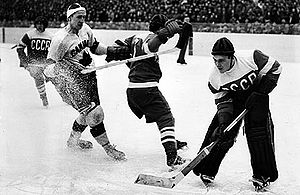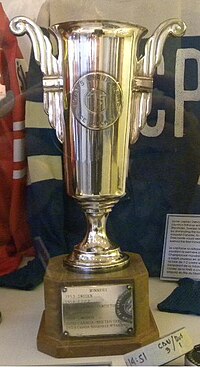
The men's ice hockey tournament at the 1956 Winter Olympics in Cortina d'Ampezzo, Italy, was the eighth Olympic Championship, also serving as the 23rd World Championships and the 34th European Championships. The tournament was held at the Olympic Ice Stadium and the Apollonio Stadium.
The men's ice hockey tournament at the 1964 Winter Olympics in Innsbruck, Austria, was the tenth Olympic Championship, also serving as the 31st World Championships and the 42nd European Championships. The games were held at the Olympiahalle Innsbruck.

The 1957 Ice Hockey World Championships were held between 24 February and 5 March 1957 at the Palace of Sports of the Central Lenin Stadium in Moscow, USSR.
The 1989 Ice Hockey World Championships took place in Sweden from 15 April – 1 May. The games were played in Södertälje and Stockholm, in the newly built arena Globen. Eight teams took part, and each team played each other once. The four best teams then played each other again. This was the 53rd World Championships, and also the 64th European Championships. The Soviet Union became world champions for the 21st time, and also European champions for the 26th time.

The 1985 Ice Hockey World Championships took place in Prague, Czechoslovakia from 17 April to 3 May. Eight teams took part, with each team playing each other once. The four best teams then played each other once more with no results carrying over, and the other four teams played each other again to determine ranking and relegation. This was the 50th World Championships, and also the 61st European Championships of ice hockey. The home side, Czechoslovakia, became world champions for the 6th time, and the Soviet Union won their 23rd European title. For the European Championship, only games between European sides in the first round are included.
The 1981 Ice Hockey World Championships took place in Sweden between 12 and 26 April 1981, with games being played in the arenas of Scandinavium in Gothenburg and Johanneshovs isstadion in Stockholm. Eight teams took part, first splitting into two groups of four, with the best two from each group advancing to the final group. These teams then play each other in the final round. This was the 47th World Championships, and also the 58th European Championships. The Soviet Union became World Champions for the 17th time, and also won their 20th European title. Don Cherry commented, "This is the best Russian team I've ever seen."
The 1978 Ice Hockey World Championships took place in Prague, Czechoslovakia from 26 April to 14 May. Eight teams took part, with each team playing each other once in the first round, and then the four best teams meeting in a new round. This was the 45th World Championships, and also the 56th European Championships. The USSR won for the 15th time, narrowly defeating the incumbent Czechoslovaks.
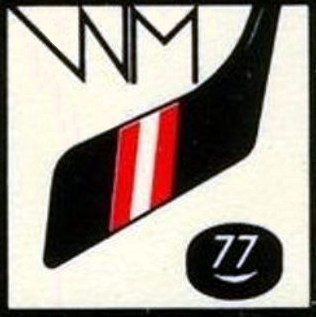
The 1977 Ice Hockey World Championships took place in Vienna, Austria from 21 April to 8 May. Eight teams took part, first playing each other once, then the four best teams advancing to a new round. The tournament was also the 55th ice hockey European Championship. Czechoslovakia won for the fifth time, and second in a row, claiming their 14th and final European title as well.
The 1976 Ice Hockey World Championships were the 43rd Ice Hockey World Championships and the 54th European Championships in ice hockey. The tournament took place in Poland from 8 to 25 April, and the games were played in Katowice. Eight teams took part in the main tournament, with each team first playing each other once. The four best teams then took part in a medal play off, and the teams placed 5–8 took part in a relegation play-off. The teams took the results from the first round through to the second round with them.
The 1975 Ice Hockey World Championships were the 42nd Ice Hockey World Championships and the 53rd European Championships of ice hockey. The tournament took place in West Germany from 3 to 19 April and the games were played in Munich and Düsseldorf. Six teams took part in the main tournament, each playing each other twice. The Soviet Union won all of their games, and became World Champions for the 14th time, and won their 17th European title.
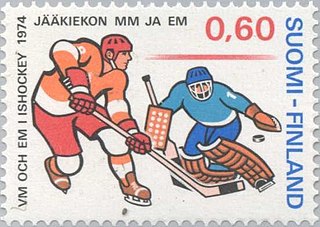
The 1974 Ice Hockey World Championships were the 41st Ice Hockey World Championships and the 52nd European Championships in ice hockey. The tournament took place in Finland from 5 to 20 April and the games were played in the capital, Helsinki. Six teams took part in the main tournament, all playing each other twice. The Soviet Union won the world championships for the 13th time, and also won their 16th European title.

The Canadian men's national under-20 ice hockey team is the ice hockey team representing Canada internationally in under-20 competition. Their primary participation in this age group comes at the International Ice Hockey Federation's World Junior Championship, held annually every December and January. The team also participates in various exhibition matches and occasional exhibition series, such as the 2007 Super Series against their Russian counterparts, an eight-game exhibition series commemorating the 35th anniversary of the 1972 Summit Series.
The 1972 Ice Hockey World Championships was the 39th edition of the Ice Hockey World Championships. The tournament was held in Prague, Czechoslovakia from 7 to 22 April 1972, and the Czechoslovakia national team won the tournament, the third time they had done so and first since 1949, ending the Soviet Union's streak of nine consecutive titles. In addition it was the Czechoslovaks' 12th European title.
The 1970 Ice Hockey World Championships was the 37th edition of the Ice Hockey World Championships. 21 nations participated in three different divisions or pools:
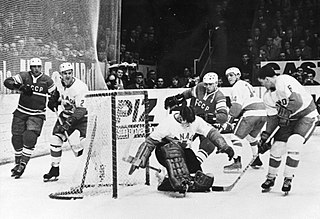
The 1967 Ice Hockey World Championships was the 34th edition of the Ice Hockey World Championships. The tournament was held in Vienna, Austria from March 18 to March 29, 1967. The Soviet Union won the tournament for the fifth straight year, Sweden won the silver medal, and Canada claimed the bronze medal.

The 1966 Ice Hockey World Championships was the 33rd edition of the Ice Hockey World Championships. The tournament was held in Hala Tivoli, Ljubljana, SR Slovenia, SFR Yugoslavia from 3 to 14 March 1966. For the fourth straight year, the Soviet Union won the tournament. For the Soviets, it was their sixth World and tenth European title. Czechoslovakia beat both Canada and Sweden two to one, to take the Silver, while the Swedes' historic loss to East Germany helped put them fourth behind Canada for the Bronze.
The 1963 Ice Hockey World Championships was the 30th edition of the Ice Hockey World Championships. The tournament was held in Stockholm, Sweden from March 7 to March 17, 1963. The Soviet Union won the tournament for the third time, starting their roll of nine straight championships. For the Soviets it was also their seventh European title.
The 1962 Ice Hockey World Championships was the 29th edition of the Ice Hockey World Championships. The tournament was held in Colorado Springs and Denver, United States from March 8 to March 18, 1962. This was the first World Championship hosted in North America that was not part of ice hockey at the Olympic Games. It also remains the only IIHF World Championship ever held in the United States.

The 1955 Ice Hockey World Championships was the 22nd edition of the Ice Hockey World Championships. The tournament was held in Düsseldorf, Dortmund, Krefeld and Cologne, West Germany from February 25 to March 6, 1955. A total of 14 nations participated in this World Championship, which was a new record for the postwar era. As a result, the teams were seeded with the strongest 9 teams placed in Pool A and the remaining 5 nations as well as the West German B team placed in Pool B.
The East York Lyndhursts were an amateur senior ice hockey team based in East York, Ontario, Canada. The team was sponsored by Lyndhurst Motors, played in the Toronto Ice Hockey League as part of the Ontario Hockey Association, and represented the Canada men's national ice hockey team at the 1954 Ice Hockey World Championships. The Lyndhursts were the first Canadian team to play against the Soviet Union national ice hockey team, losing by a 7–2 score to place second overall at the World Championships.

